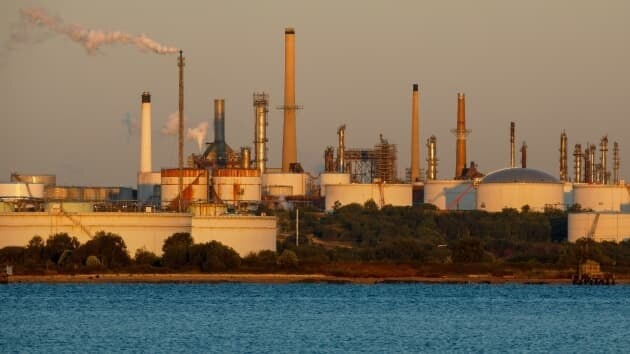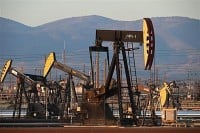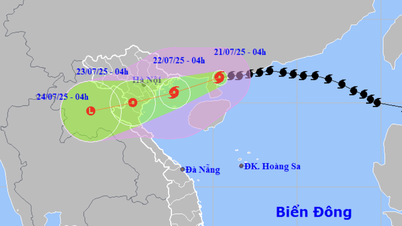 |
| OPEC+ cuts oil production: Not the US, these countries feel the most 'pain' (Source: Bloomberg) |
“It’s a tax on every oil-importing economy ,” said Pavel Molchanov, CEO of private investment bank Raymond James. “ It’s not the US that will feel the most pain when oil hits $100 a barrel, but countries that don’t have domestic oil resources: Japan, India, Germany, France…”
The voluntary production cuts by the Organization of the Petroleum Exporting Countries (OPEC) and its partners (OPEC+) will begin in May and last until the end of 2023. Both Saudi Arabia and Russia will cut oil production by 500,000 barrels per day until the end of this year.
Meanwhile, the UAE, Kuwait, Iraq, Oman and Algeria also announced voluntary cuts of 144,000 barrels/day, 128,000 barrels/day, 211,000 barrels/day, 40,000 barrels/day and 48,000 barrels/day, respectively.
OPEC+ accounts for about 40% of global crude oil production. The decision is in addition to the 2 million barrels per day cut announced in October 2022.
According to experts, the unexpected decisions of the above countries could cause oil prices to skyrocket to $100/barrel.
“The regions most affected by oil supply cuts and soaring crude prices are those with high import dependence and heavy use of fossil fuels in their primary energy systems,” said Henning Gloystein, director of Eurasia Group.
That means the sectors most affected are import-dependent industries, especially in South and Southeast Asia, as well as the import-dependent heavy industries of Japan and South Korea."
India
India is the world's third-largest oil consumer and has been buying Russian oil at a deep discount since the West imposed sanctions on Moscow in response to its military intervention in Ukraine.
India's crude oil imports rose 8.5% in February 2023 from a year earlier, according to government data.
“Although India is still reaping the benefits of buying cheap Russian gas, the country will face difficulties when coal and gas prices rise,” Mr. Gloystein commented.
Japan
Petroleum is the most important energy source in Japan and accounts for about 40% of total energy supplies.
“The country is heavily dependent on crude oil imports, with about 80% to 90% coming from the Middle East,” said the International Energy Agency (IEA).
Korea
Similar to Japan, for South Korea, oil accounts for the majority of its energy needs, according to independent research firm Enerdata.
“South Korea and Italy depend more than 75% on imported oil,” Molchanov pointed out.
Impact on emerging economies
Some emerging markets “that do not have the foreign exchange capacity to support fuel imports” would be negatively affected if oil prices hit $100 a barrel, Molchanov said, naming Argentina, Turkey, South Africa and Pakistan as potential economies that would be affected.
Sri Lanka, a country that does not produce oil domestically and is 100% dependent on imports, is also likely to be more severely affected, the expert said.
“Countries with the least foreign exchange reserves and oil importers will be hit the hardest because oil is priced in dollars,” said Amrita Sen, founder and research director at Energy Aspects.
He added that import costs would increase further if the greenback appreciated.
However, Mr Molchanov also noted that the $100/barrel price will not be permanent. “In the long term, the price of this commodity may be more suitable, in the range of $80-90/barrel,” he said.
Mr. Gloystein said: "Once crude oil reaches $100/barrel and stays there, producers will increase production again."
 | OPEC+ production cut: Energy industry surprised, experts say oil prices will increase by $10/barrel On April 2, other oil-producing countries of the Organization of the Petroleum Exporting Countries (OPEC) and its partners, or ... |
 | On April 3, US Treasury Secretary Janet Yellen said that the surprise cut in oil production by the Organization of the ... |
 | Major oil producers led by Saudi Arabia said they would once again cut crude supplies. The decision ... |
 | OPEC+ cuts oil production: US gasoline prices to rise to $4/gallon? Supply squeeze may not stop? US gasoline prices could rise to $4 per gallon after the Organization of Petroleum Exporting Countries (OPEC) on April 2... |
 | OPEC+ oil production cut: A 'gift' for the US President? The recent decision by the Organization of the Petroleum Exporting Countries (OPEC) and its partners (OPEC+) to cut ... |
Source





























![[Photo] National Assembly Chairman Tran Thanh Man visits Vietnamese Heroic Mother Ta Thi Tran](https://vphoto.vietnam.vn/thumb/1200x675/vietnam/resource/IMAGE/2025/7/20/765c0bd057dd44ad83ab89fe0255b783)



































































Comment (0)